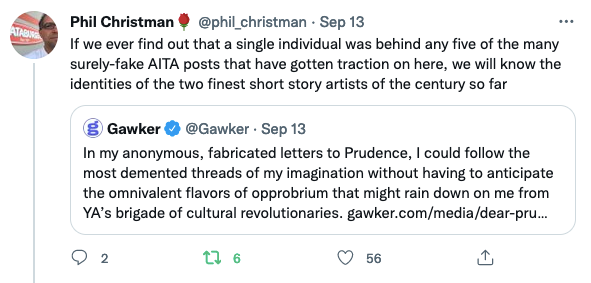Warm Take: Reading and Believing. November 8, 2021

Shortly after high school, I did something lousy. A close friend had gone to a gathering of a high school musical group. At the party, the host had done something socially awful, humiliating one of the partygoers. My friend was outraged. Revenge I mean justice was in order.
Thankfully, this happened before the Internet. Otherwise, I’d have to link to the fake letter I sent to Dear Abby, describing the events as though I had been at the party, and which was subsequently published in the Chicago Tribune.
Today's vindictive teen would find multiple outlets suitable for shaming a mean girl.

Hence my jaded eye when something like a well-written workplace-related AITA-type piece crosses my feed.
A typical example was recently broadly shared, even by multiple people whom I respect. In this case, the author was the Mean Person, ostensibly looking for validation about something awful they had done at work.
To be clear, the story was more than credible.
I wondered what was happening. And, who really wrote it?
It would take me about a half-day to write a polished 500+ word narrative about my own wrongdoing at work. (Am I typical? Idk.) Surely the effort to write and edit a thoughtful piece about one's own workplace malfeasance could kill any buzz about outing oneself on the Internet?
Is how the story wound up on the Internet credible?
I watched the conversation unfold online, thinking, “The Discourse about this story is bananas.”
And then I fell into a rabbit hole about The Discourse, itself, which seems to be a Twitter thing, right? What is The Discourse? What’s its function?
And being me, I was looking for a definition. The Merriam-Webster definition circles around an exchange of ideas. This exchange may even be orderly. This is not what's happening online.
I started asking around. My friend Ana Milicevic called it “discussions around Twitter's main character each day/week,” and related it to media cycles. Christina Xu said, “I’m not sure I’ve ever quite seen a coherently written out definition, but I think when I use it I broadly mean: ‘the conversation surrounding a thing, which very rapidly spirals wildly beyond that thing.’”
Yes. My working hypothesis: The Discourse is not about the thing itself, it’s about the people involved in the thing, as characters. And its wild and rapid spiral is not orderly. It is not a thoughtful exchange, fueled by ideas. It's a narrative, fueled by emotional contagion.
So, when I read something about people management that makes me mad enough enter into The Discourse, what’s happening?
Aaahnd, pondering all of this, I was struck by tech writer Charlie Warzel’s post about moving his newsletter to The Atlantic.
Charlie uses the term “discourse funding” to describe a phenomenon in the financially successful corner of the Substack-style paid newsletter ecosystem.
For people whose work is either too wonky or too reactionary, or too progressive or too reckless or too ‘whatever’ to be palatable to a mainstream media organization, independent projects like a newsletter fit.
People are more willing to pay for content that wouldn’t exist elsewhere. And, if it’s grievance-based, there’s some amount of ‘Discourse Funding’ that’s going on. I pay this person to keep pissing off these people.
Galaxy Brain Is Moving! by Charlie Warzel
So pondering all of this, a question for On Management: does the Discourse make you a better manager? I mean I don’t know. But I doubt it.
What makes a better manager is real discourse, with people you work with. Ask someone in your circle who has experience, not Reddit. Gather or join a peer group of managers. Read books together! Talk. Ask one another, AITA?
And when someone’s a real jerk at work? You can spend a few hours of your wild and precious life getting justice I mean revenge by slinging a few well-turned phrases onto the Internet.
When you’re fortunate, you have some choices. You could invest a half day deciding whether you can get useful feedback to the offender. You can decide whether to work around people who treat their team members terribly.
And when something you read on the Internet makes you mad, you can choose to interrogate it.
Thanks for reading my Sunday morning Warm Take, written while drinking coffee and recovering from my Covid booster. I try to write each Warm Take quickly, and frequently go back and correct typos and unclear points in the online version. Today's edition goes out all subscribers, courtesy of Supporting Members, who pay to receive On Management. Many thanks to everyone who reads my newsletter.
I welcome your questions and ideas, and will continue to endeavor to be part of an actual discourse about people, managing, and the workplace.
May you and yours be safe, healthy, and free.
P.S. I was inspired to start On Management in 2015, because I was concerned about people reading terrible things online – so this was on my mind last week, as I finally got my About page back up online. Feedback is welcome and likely in order.





